November 7
Allies Advance Along 200-Mile Battle Line
From the Dutch frontier to the east of the Meuse, the 200-mile battle line is aflame as British, French, American and Belgians crush the resistance of the enemy and push on for important gains. Everywhere on the line the Allies are progressing.
Germany’s shattered armies are in rapid retreat. So rapid is the retirement that it is very difficult to determine the exact location of the contending forces along the front. There is evidence that the Germans are not carrying out the orderly retreat that marked their retirement from earlier withdrawals. Batteries of field guns, with horses still
attached, along with a vast quantity of ammunition which could be move quickly under ordinary circumstances, has fallen into the hands of the Allies.
As an indication of the plight of the retreating Germans, it is known that on the entire Western front the enemy has in reserve only one division, which has been out of the battle one month, and four divisions, which have been resting for 2 to 4 weeks. The Germans, it is believed, have used all their reserves on the front opposite the Americans,
the last enemy divisions in reserve on this sector having been thrown in as last ditch desperate effort to stem the American advance.
Central Powers Descend Into Anarchy
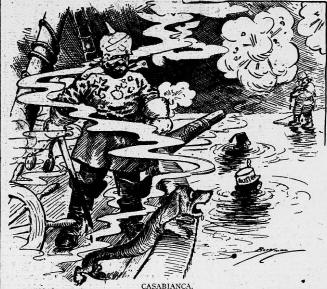 Kiel, homeport of the main German fleet, has been ceased by a Workman’s and Soldiers’ Council. All the workshops have been occupied by Red troops and the streetcar lines and railways are under the control of the Workman's Council. The
entire German Navy is in the hands of Bolshevik revolutionists according to reports received in Copenhagen.
Kiel, homeport of the main German fleet, has been ceased by a Workman’s and Soldiers’ Council. All the workshops have been occupied by Red troops and the streetcar lines and railways are under the control of the Workman's Council. The
entire German Navy is in the hands of Bolshevik revolutionists according to reports received in Copenhagen.
As crewman of battleship Kaiser hoisted the Red flag, Officers attempted to defend the German flag, but were overpowered and two of them, including the commander, were killed. Three companies of infantry sent to restore order immediately joined the revolution. Revolt has also broken out in Hamburg where violent fighting is in progress in the
streets of the city. A strike of dockworkers involving 10,000 men is reported.
King Boris of Bulgaria, who ascended on the throne on October 3, has abdicated. A peasant government has been established to rule the country and a Republican army of 400,000 men has been formed.
The Austrian State Council has issued an appeal to the German people of Austria, in which it is declared that the country is in danger as any semblance of order in army disintegrates. The Council appealed to soldiers to voluntarily join the new German-Austrian Army Corps. The Council points out that troops from non-German districts are going home,
while German soldiers, tired from the long duration of the war, are leaving their units without considering that the irregular demobilization brings the danger of widespread unemployment, hunger and misery. The prison camps are being abandoned by their guards, and Italians, Russians, and Serbians leaving the camps are flooding the country.
"The danger", the Council declares, "must be countered if fresh bloodshed is not to threaten our severely tired people and tens of thousands of men, women and children perishe with hunger."
Meanwhile a state of anarchy prevails throughout Turkey. Hundreds of thousands of army deserters are subsisting by means of robbery and pillaging. Constantinople is declared to be literally famished and impatiently awaiting the arrival of Allied forces.
Allies Issue First Condition for Armistice
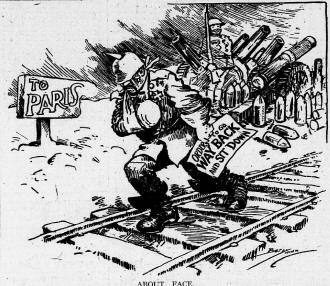 The Allied Supreme War Council has proposed its first condition for an armistice - that Germany withdraw her armies, without their military supplies, from France and Belgium, to 30 miles east of the German side of the Rhine River, and
that the entire German Navy, including all submarines, along with all its rail stock, be surrendered immediately.
The Allied Supreme War Council has proposed its first condition for an armistice - that Germany withdraw her armies, without their military supplies, from France and Belgium, to 30 miles east of the German side of the Rhine River, and
that the entire German Navy, including all submarines, along with all its rail stock, be surrendered immediately.
From a military point of view, the proposal that German armies be disarmed and retired 30 miles beyond the Rhine is tantamount to unconditional surrender. It would not only throw open to the Allied armies many roads to Berlin itself.
Undoubtedly the object sought in proposing that the enemy retire 30 miles behind the Rhine is to destroy the German inner defense system. That system is supported by a chain of fortresses, without which the line would be untenable. Along with the surrender of all railway rolling stock, acceptance of this term of the proposed Armistice would
deprive the Germans of the means to resume the war.
November 14
Germany Accepts Armistice, War Ends
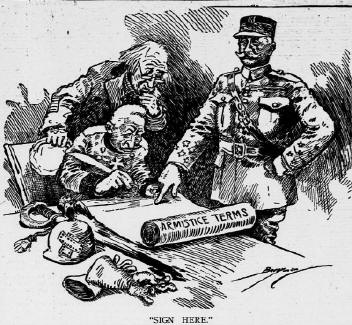 On Sunday, the German’s formally accepted the terms for an armistice proposed by the Allies and at midnight, Sunday night, the armistice between the Allies and the Germans went into effect.
On Sunday, the German’s formally accepted the terms for an armistice proposed by the Allies and at midnight, Sunday night, the armistice between the Allies and the Germans went into effect.
In a statement to the German people on the country’s acceptance of the Allied Armistice terms, the German Imperial Chancellor said: "In the fifth year of hostilities, abandoned by our Allies, the German people could no longer wage war against increasingly superior forces. Our soldiers have fought to the last moment as great as any army has ever
done. The homeland has sustained unprecedented strains and sufferances. The victory for which many have hoped had not been gained by us. But the German people has won a still greater victory in that it retains its belief in the right of might. From this victory we shall draw a new strength for the hard times which faces us and we will build a new
future and rise again."
With the signing of the terms, it was officially announced at the War Department that all draft calls had been suspended.
Reds take control of 14 of 26 states in Germany
Each hour brings fresh news of the revolution which is sweeping the German Empire. The revolution in Germany is today, to all intents and purposes an accomplished fact. 14 of the 26 states are reportedly securely in the hands of revolutionists.
The Red flag of revolution is waving over a continually increasing area of Germany. The cities of Bremen, Schwerin and Tilsit have joined in the German revolution, as have Hanover and Oldenburg. The revolt has spread from the Northwest along the North Sea southeastward to Westphalia. Cologne on the Rhine is reported affected. In Berlin, great
street demonstrations are taking place with marchers carrying banners with the inscriptions "freedom, peace and bread" and singing the workmen's "Marseillaise."
The great German maritime port of Hamburg is completely in the hands of revolutionist, the Red flag is flying all over the ships in the harbor. Virtually all the German fleet has revolted. The movement which resulted in the seizing of virtually the entire German Navy by revolutionary forces was carried out in a fairly peaceful manner. The Red flag
was hoisted quite generally. All the large wharves connected with the naval services also were taken over by the revolutionist.
While the revolt has not been attended by serious disturbances, the German press has made an appeal to Germans to remember that the adoption of Bolshevism would mean continued war with the Allies and misery for the people. It is significant that the majority of the multitude of proclamations issued daily are addressed to comrades rather than to
citizens and that references are no longer made to the Socialist Republic but to the People's Republic.
Meanwhile, in an attempt to prevent Germany from falling into the hands of the Bolsheviks, an agreement has been reached between the Socialist and Independent Socialist parties in Germany to form a new Government.
Although the Bolsheviks are part of the Independent Socialist Party, they are recognized as a separate organization. A decided majority of socialist are non-Bolshevik independents. And a vast majority of Soldier’s and Workman's Council’s have energetically oppose the plans of the Bolshevik element.
Kaiser and Son Renounce Throne
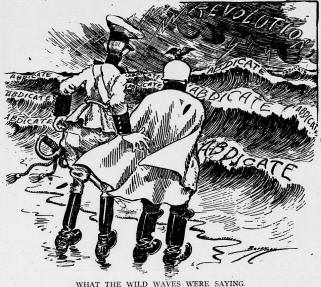 On Saturday, Kaiser Wilhelm, the German Emperor renounced the throne to the German Empire. The German Crown Prince also renounced the throne.
On Saturday, Kaiser Wilhelm, the German Emperor renounced the throne to the German Empire. The German Crown Prince also renounced the throne.
Thirty years after he ascended the Imperial throne, his armies now defeated in the field, forced to sue for armistice terms and the German people rising in revolt, the Kaiser gave up his power. He came into authority with his country at the threshold of an era of peace and material progress; he leaves it torn by revolution and ruined from the
hardships and sacrifices of more than four years of war.
With the passing from power of Emperor William, all heads of governments of the Central Powers when the war started have died or lost their thrones. Austrian Emperor Francis Joseph and the Sultan of Turkey died before their countries agreed to the Allied armistice terms. Ferdinand of Bulgaria abdicated last month, succeeded by his son, who gave up
the throne with his people rose against him last week. The other European emperor at the beginning of the war, Czar Nicholas Romanoff, was disposed in March, 1917 and murdered in July, 1918.
On Sunday, the former German Emperor made an inglorious entry into Holland where he sought asylum. According to reports, at 7:30 Sunday morning, ten travel-stained automobiles driven by Prussian officers were seen coming slowly through the fog toward the Dutch border. The Dutch frontier guards stopped the cars. After some brief formalities the
automobiles were conducted to the railway station at Eysden. An Imperial train arrived at the station an hour later. It consisted of 14 cars, and the former Emperor, who had walked up and down the railway station, stooped over, entered the train and changed into civilian clothes.
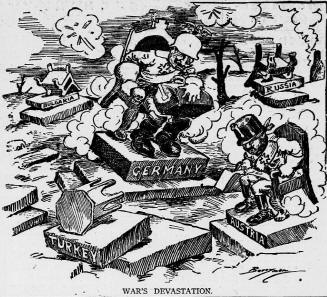 The Kiser was allowed to only take his personal property onto the train, the non-personal property which was brought to Holland was confiscated as is usual in internment cases. The property and assets of the Prussian crown that
remaining in Germany will be confiscated by the new German Government under the administration of the Ministry of finance.
The Kiser was allowed to only take his personal property onto the train, the non-personal property which was brought to Holland was confiscated as is usual in internment cases. The property and assets of the Prussian crown that
remaining in Germany will be confiscated by the new German Government under the administration of the Ministry of finance.
In a published statement, the former German Emperor stated his reasons for going to Holland was taken to facilitate the work of the new German government by ridding them of any embarrassment his presence in Germany might cause, such as an attempt to make him the center of loyalist agitation.
Holland stated it would permit the former German Emperor to remain on Dutch soil on the same terms of interment as other higher officers of the German army. The Kiser has taken the name of Count William Hohenzoilern and is expected to buy an estate and remain in Holland.
Meanwhile, Field Marshal von Hindenburg has sent a message to Army commanders ordering them to leave their troops home. The order of the Field Marshal reads: "I order all officers to lead their troops home in order and discipline. I expect the command, staff, and officers, noncommissioned officers and men to continue to do their duty."
November 21
Yankees Advance Towards Germany
The American army will begin to move towards Germany at five o'clock Sunday morning. The Army will travel about 12 miles each day. The advance will be made in columns and not in the order of battle so long followed. But it is not forgotten that, technically, as Germany and the Allies are still in a state of war, nothing will be left to chance and
every contingency will be taken to guard against surprises.
The arrangement of the forces are such that the entire formation could be altered almost in minutes to battle formation. Divisions moving on the front will have others in support and the flanks will be carefully covered. In addition, a long line of observation balloons will be up behind the lines, and they too, will be moving slowly forward,
observing the movements of the retreating Germans.
The advance troops will be followed by engineers, who have been instructed not only to repair roads, reconstruct bridges, and clear the general way, but to inspect keenly every object and position that might be a trap. Mines will be sought carefully, and, if found, exploded. The Germans have sent word that the way is opened and mines removed,
except in cases where they have designated. Water also will be inspected carefully, and none permitted to be used until pronounced safe.
U.S. Begins to Dismantle Army
General March, Chief of Staff of the US Army, announced that within the next two weeks 200,000 men in military camps in the country, will be demobilized, and that the demobilization will proceed thereafter at a rate of 30,000 a day.
Regarding the return of the troops in France, General March said the order in which the divisions will be withdrawn is being left to General Pershing. It is the intention of the War Department, so far as is practicable, to return each division to the locality from which the majority of its men came and to parade the divisions in cities such that
the people may have a chance to welcome them home. Ports of the Atlantic coast, from Boston to Charleston are being readied to handle returning troops.
Steps already have been taken towards the organization of a permanent army. All men now in the Army will be offered a position in the new army. A furlough of one month will be given as an incentive to reenlist.
The return of commissioned persons of the Army to civilian life, would be affected by dividing the present list of officers into three classes - those who desire commissions in the regular Army, those who are willing to hold themselves available for future service as reserve officers and those who desire honorable discharge from the service.
Allies Prepare For Peace Conference
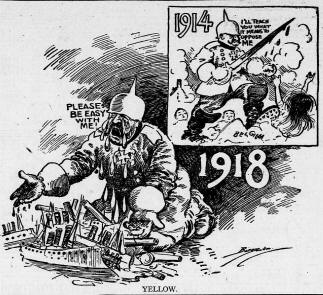 As soon as the armistice was signed it became evident that before the Allies could dictate terms to Germany they would have to reach a complete understanding among themselves on the issues that must be addressed. As a result, it is
apparent to officials in Allied capitals that a preliminary inter-Allied conference must take place prior to the official start of the peace conference.
As soon as the armistice was signed it became evident that before the Allies could dictate terms to Germany they would have to reach a complete understanding among themselves on the issues that must be addressed. As a result, it is
apparent to officials in Allied capitals that a preliminary inter-Allied conference must take place prior to the official start of the peace conference.
The Allies have only to dictate their terms. But first they must agree upon themselves on the following Points:
- The future of Alsace-Lorraine
- The territory on the west bank of the Rhine
- Shall Belgium annex additional territory?
- What shall be done with the German colonies?
- Shall the Germans of Austria be permitted tonight would Germany?
- Delimitation of the Polish, and frontiers of the Baltic states and of the various new ones of eastern Russia in central Europe.
- What territory, if any, shall Turkey retaining in Europe? What shall be done with Constantinople?
- What shall be done with Palestine, Syria, Lebanon, Armenia, Mesopotamia?
- What annexations, if any, Shell Japan effect?
- What restoration and indemnification shall be exacted from the enemy countries and under what conditions?
Study of the German financial situation has been undertaken with a view to throwing light on the ability of the Germans to pay reparation for the devastation inflected upon the invaded countries. Unofficial reports indicate that Germany's national debt, represented mainly by war bonds held within the empire is now nearly 35 billion Marks, or more
than 2/5ths the estimated national wealth of the entire nation.
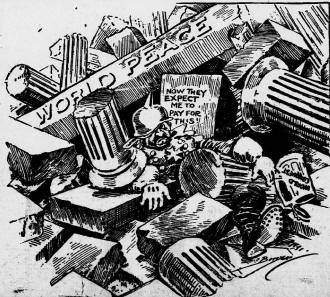 Although there has been no official announcement of the amount, which the Allies would expect Germany to pay, it is certain to run into billions of dollars. The ability of the German’s to pay reparations will be measured by that
nation's power to revive her peacetime industries and trade, and raise taxes for the stated purposes. Financial observers say some claims for reparations set forth by interested parties are extravagant, and are far beyond Germany's ability to pay, and could harm, in the long run, the ability to establish a stable peace in Europe.
Although there has been no official announcement of the amount, which the Allies would expect Germany to pay, it is certain to run into billions of dollars. The ability of the German’s to pay reparations will be measured by that
nation's power to revive her peacetime industries and trade, and raise taxes for the stated purposes. Financial observers say some claims for reparations set forth by interested parties are extravagant, and are far beyond Germany's ability to pay, and could harm, in the long run, the ability to establish a stable peace in Europe.
Germany has asked that the terms of the armistice be modified so that she can have economic intercourse with the territory on the west bank of the Rhine as before the armistice. "In view of the close economic relationship between the country west of the Rhine and the remainder of Germany, the preservation of it is necessary to the continued
peaceful development of Germany," stated the German negotiators.
The German negotiators asked permission for German owners to exploit as heretofore the coal, potash and iron ore mines and the continued free use of the Rhine for transport within the old boundaries of the German Empire. The foreign secretary also asked permission for the navigation, by way of Rotterdam and the coast, for the provisioning of
Germany. The German foreign minister declared that "without these modifications Germany will advance towards Bolshevik conditions, which might become dangerous to neighboring states."
German Back Ukrainian Government Overthrown
The German backed Ukrainian government has been overthrown and the Ukrainian capital has been captured by anti-Bolshevik troops. The Ukraine became a republic during the disorders in Russia after the overthrow of the Kerensky government in November, 1917. There was much fighting there between the Bolsheviks and their opponents, resulting in the
defeat of the Bolsheviks. The Ukrainian government made peace with Germany at Brest-Litovsk a few days before the Russian Bolshevik government also agreed to the German terms. German troops then entered the Ukraine for the purpose of carrying out the economic articles of the peace treaty.
The Ukrainian government was overthrown last May and was replaced by a dictator supported by the Germans when the Ukrainians failed to deliver the anticipated grain supplies that Germany so desperately need to stifle growing internal public unrest in Germany that was treating her ability to continue to carry on the war against the allies. The
overthrow of the German back government was led by the Cossacks, and it is expected that the European powers will supply the new government with necessary munitions, by way of the Black Sea, to ensure that the new government remains loyal to the Allies, and not fall under the influence of the Bolsheviks in Moscow.
November 28
Allied Armies Continue Advance
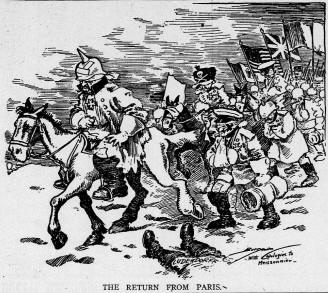 With General Pershing, the American Commander-in-Chief at her side, the youthful Grand Duchess of Luxembourg watched American troops march into her capital. Twenty-four hours earlier she had seen the long columns of gray clad German soldiers
depart for their own country after the occupation of her Duchy four years ago.
With General Pershing, the American Commander-in-Chief at her side, the youthful Grand Duchess of Luxembourg watched American troops march into her capital. Twenty-four hours earlier she had seen the long columns of gray clad German soldiers
depart for their own country after the occupation of her Duchy four years ago.
The Grand Duchess and the member of her cabinet expressed gratification that Americans have come to take the place of those they have been forced to tolerate for so many years. Popular approval was expressed in a great demonstration when the people cheered Gen. Pershing, and again, when the dusty columns of American soldiers move through the
streets.
Meanwhile, the British cavalry today are riding across the fields of Waterloo on their way to the German frontier.
In Belgium, King Albert and the Belgian government were expected to make official entry into Brussels. Belgian troops reached the capital on Thursday and restored quiet. The newspapers resumed publication and Belgian flags are flying everywhere in celebration of the return of the King. King Albert will reopen parliament on Friday immediately after
he reviews the troops.
American troop casualties numbered
Total casualties from all sources of the American Expeditionary Force up to the signing of the armistice were 235,117. The casualties were divided as followed: killed or died of wounds, 36,154; died of disease, 10,811; died from other causes, 2294; wounded, 179,625; prisoners 2,163; missing in action 1,160.
Authority has been given to General Pershing to send back home all such troops that he will not be needed in making up the army of occupation. The return of the units from France will be expedited in every way and they will not be permitted to sneak into the country either. It is expected grand celebrations will be held throughout the nation to
welcome the troops home.
Demobilization of the forces that are home is proceeding steadily. Camps will be abandoned as soon as they are cleared of their occupants. And no further construction work will be done at those places. Cancellation of all war contracts, both in the United States and abroad, have begun, and no more war bonds will be sold.
Bolsheviks Lose in German Elections
Keenest interest is felt throughout the German Empire on the conference between the Federal states at Berlin. The question of summoning a new national assembly and ensuring the unity of the empire is being discussed everywhere. It is generally expected that a decision will be reached to call the national assembly at the earliest possible moment.
Reports of tests of strength between the conservative elements and the Independent and Bolshevik Socialist in various places in Germany continued to indicate that as far as mere numbers go the extremist are almost negligible.
The elections to the Soldiers’ and Workman’s Council in Dresden Sunday showed the Bolsheviks won only three or four seats on the Council of 50. Reports from Bremen and the coast cities have shown the people have already turned away from the more radical elements towards a more conservative channel.
A meeting of Soldiers’ and Workers’ and Peasants’ Councils in almost every major German city adopted resolutions declaring they would stand behind the present government now forming, made up of conservative and moderate elements. This is a crushing defeat for the extremists who wanted to follow the Russian Bolshevik model for governing Germany.
Soldiers arriving from the front have declared that the great bulk of the soldiers reject Bolshevism in all its phases. It also may perhaps be considered an indication of the general public's faith in the conservatism that German and Prussian flags are beginning to reappear all Germany, after having made way for the Red flag.